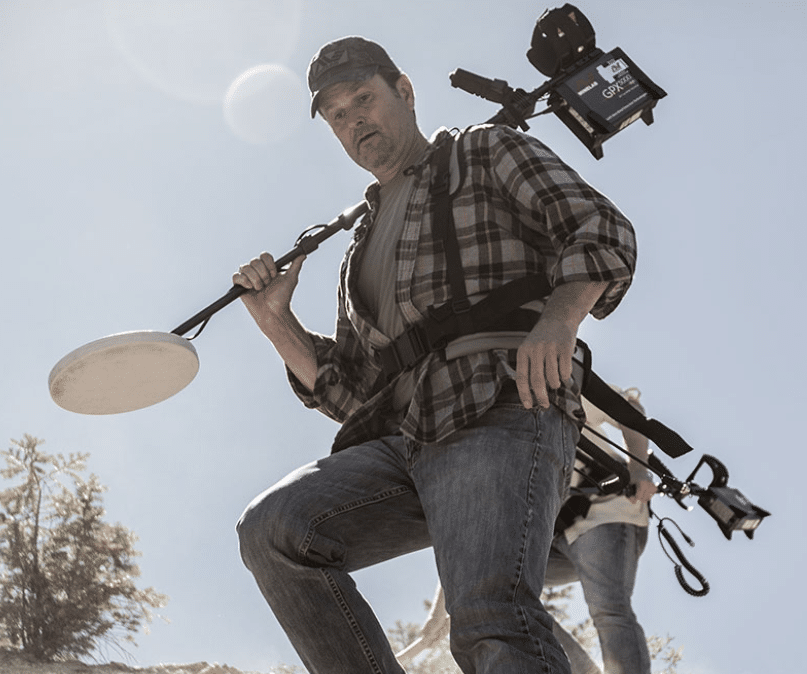
Looking for the best deep gold metal detectors? The Garrett Vortex VX7, Fisher Gold Bug 2, and Minelab Gold Monster 1000 are top picks. The Garrett Vortex VX7 excels with MD-MF technology and is future-proof. The Fisher Gold Bug 2 offers high-frequency precision and dual coils, while the Minelab Gold Monster 1000 provides automatic features with superior sensitivity. Each offers unique advantages, and there’s more to discover about these stellar choices.
Key Points
- Garrett Vortex VX7 offers advanced target separation and accuracy with MD-MF technology, suitable for various terrains and future-proof with software upgrades.
- Fisher Gold Bug 2 operates at 71 kHz, ideal for detecting small and deep targets, featuring manual ground balance and dual search coils.
- Minelab Gold Monster 1000 uses a 45 kHz VLF system, providing automatic operation with ground balancing and is user-friendly with a sensitive touchpad interface.
- Lightweight and ergonomic designs are key features of the top detectors, ensuring comfort for extended use and effective in challenging environments.
- Each model offers unique features like precise gold identification or dual-use adaptability, enhancing their versatility for various metal detection needs.
Top Three Best Deep Gold Metal Detectors
As you evaluate the top contenders in deep gold detection, consider the Garrett Vortex VX7 for its advanced target separation and accuracy, vital for distinguishing between valuable finds and common metals. The Fisher Gold Bug 2 excels with its high-frequency performance and sensitivity, ideal for detecting small gold nuggets in mineralized soil. Finally, the Minelab Gold Monster 1000 offers cutting-edge technology with automatic ground balance, making it highly adaptive to various terrains for consistent results.
Garrett Vortex VX7 Metal Detector

The Garrett Vortex VX7 stands out for those seeking a high-performing, versatile metal detector in your quest for deep gold discoveries. Weighing only 2.9 pounds, it’s easy to handle during extended field exploration. Its MD-MF technology excels in challenging environments like saltwater and mineralized terrains. With a waterproof capability up to 16 feet, it’s perfect for beach hunts. The VX7 allows software upgrades to VX9, enhancing future functionalities. Using the built-in Z-Lynk Wireless, pair headphones effortlessly for real-time audio feedback. While customers praise its design and functionality, mixed reviews suggest checking thorough specifications and warranty details for maximum satisfaction.
Best For: Hobbyists and adventurers seeking a lightweight and versatile metal detector for challenging environments like beaches and mineralized areas.
Pros:
- Lightweight design suitable for prolonged use.
- MD-MF technology for effective performance in saltwater and mineralized soils.
- Upgradable software for enhanced future functionalities.
Cons:
- Mixed reviews on signal lock-in and identification accuracy.
- Wireless headphones need to be purchased separately.
- Warranty details might require further clarification.
Fisher Gold Bug 2 Metal Detector

Fisher Gold Bug 2 Metal Detector stands out as a top choice for prospectors chasing elusive, deep gold nuggets. With a remarkable 71 kHz operating frequency, it excels at detecting small and deep targets. You’ll appreciate its dual elliptical search coils: a 6-inch for precision in tight spots, and a 10-inch for wider coverage. Its iron discrimination feature filters out unwanted ferrous metals, focusing your search on gold. The manual 16-turn ground balance and mineralization switch enhance performance in challenging terrains. Lightweight at 2.9 lbs, its ergonomic design guarantees prolonged, comfortable use, making it an excellent investment for any enthusiast.
Best For: Treasure hunters and metal-detecting enthusiasts seeking small and deep gold nuggets in a variety of terrains.
Pros:
- High sensitivity with 71 kHz frequency for detecting small and deep targets.
- Dual search coils for precision and extended coverage.
- Ergonomic design enhances comfort during prolonged use.
Cons:
- Some users report issues after the warranty period.
- Limited effectiveness in detecting larger items due to high frequency.
- Requires manual ground adjustments, which might be challenging for beginners.
Minelab Gold Monster 1000 Gold Detector

Consider the Minelab Gold Monster 1000 Gold Detector if you’re a prospector looking for an advanced yet user-friendly metal detector. Its 45 kHz VLF and 24-bit signal processor guarantee precise gold identification, even in salty soils. You’ll appreciate its fully automatic operation, featuring automatic noise canceling and ground balancing for ease of use. With modes like gold chance indicator, iron reject, and all-metal detect on a touchpad interface, it’s built for efficiency. Weighing just 2.9 pounds, its adjustable length provides comfort during extended searches. Despite a learning curve with the manual, online resources enhance your understanding and technique.
Best For: Prospectors seeking a metal detector that combines advanced technology with user-friendly features for precise gold identification.
Pros:
- Lightweight design and adjustable length for comfortable, extended use.
- Fully automatic operation with modes like gold chance indicator and iron reject for ease of use.
- Enhanced sensitivity to detect small gold nuggets even in highly mineralized or salty soils.
Cons:
- Initial difficulty with understanding the manual may require seeking additional online resources.
- Considered expensive compared to some other metal detectors.
- May have a learning curve for complete beginners in understanding its advanced features.
Things To Consider When Buying A Metal Detector To Find Gold
When buying a metal detector for gold, you should consider the detector’s frequency range as higher frequencies often detect small gold nuggets better. Ground balance features are essential since they allow the detector to distinguish between gold and the mineralized ground, helping you avoid false signals. Additionally, pay attention to detection depth capacity, sensitivity settings options, and coil size, as these affect the precision and depth of your search, ensuring you don’t miss valuable finds.
Detector Frequency Range
One essential factor that greatly influences a metal detector’s performance in finding gold is its frequency range. Gold, being small and conductive, is best detected using higher frequencies. If you’re targeting gold nuggets, consider detectors operating above 18 kHz for peak sensitivity. Lower frequencies may penetrate deeper, but they risk missing tiny gold pieces. A versatile frequency range, like multi-frequency detectors, offers adaptability, letting you adjust based on specific conditions and targets. Dual-use detectors capable of shifting between frequencies provide flexibility, making them valuable if you seek more than just gold. Remember, selecting a detector with the right frequency range guarantees you’re well-equipped to uncover gold in various settings, maximizing your chances of striking it rich.
Ground Balance Feature
An essential feature to evaluate when buying a metal detector for gold is its ground balance capability. This function lets you differentiate between metal targets and the mineral-rich soil often encountered in gold prospecting areas. Without effective ground balance, your detector may give false signals, confusing hot rocks or mineralization with gold. There are three main types of ground balance: preset, manual, and automatic. Each offers distinct advantages. Preset is user-friendly but less adaptable. Manual ground balance allows detailed customization, ideal for varied terrains but demands more expertise. Automatic ground balance adjusts in real-time, offering convenience but possibly less precision. Consider your needs and terrain variability when choosing, ensuring the detector aligns with your skill level and search conditions.
Detection Depth Capacity
In the domain of metal detecting, ground balance plays a pivotal role in minimizing false signals, but detection depth capacity holds equal importance when searching for gold. You must gauge a detector’s depth capacity by examining technology such as pulse induction (PI) and very-low-frequency (VLF) systems. PI detectors excel in mineralized soils, offering enhanced depth penetration. Meanwhile, VLF detectors, though often more sensitive to smaller nuggets, may not reach the same depths. When evaluating depth, consider coil size; larger coils generally penetrate deeper but may sacrifice sensitivity to small targets. Balance your needs: a hybrid approach using both PI and VLF could maximize efficacy. Always test units in varied environments to grasp their true depth performance and align them with your specific search requirements.
Sensitivity Settings Options
Understanding sensitivity settings is essential when choosing a metal detector for gold hunting. Sensitivity controls the detector’s response to metal targets; higher sensitivity means greater detection depth but can also lead to false signals from mineralized soils. You’ll want a detector offering fine-tuned sensitivity adjustments, allowing you to balance depth and stability based on ground conditions.
Expert insight suggests that ideal sensitivity settings vary depending on soil mineralization and interference levels. Opt for models with automatic ground balance capabilities to automatically adjust sensitivity, increasing your chances of accurate detection. Additionally, consider how easy it is to change settings on the go. User-friendly interfaces facilitate quick adjustments, so you can swiftly react to changing conditions, maximizing your gold hunting success.
Coil Size Impact
When buying a metal detector to find gold, coil size plays a crucial role in its performance. A larger coil covers more ground, which lets you search expansive areas quickly, enhancing depth detection capabilities. However, they can be less effective in detecting smaller gold nuggets. Smaller coils offer precision and sensitivity, excelling in areas with dense mineralization or high trash content. They help isolate targets and minimize interference. Consider your prospecting environment: vast open spaces or dense, cluttered areas? For versatility, opt for a detector with interchangeable coils if budget allows. This flexibility guarantees you’re well-equipped for varying terrains and target sizes. Ultimately, matching coil size to your environment and target type maximizes your chances of striking gold effectively.
Build Quality Durability
Durability is a crucial factor when choosing a metal detector built to uncover gold treasures. You want a device that withstands harsh environments and extensive use. Focus on detectors made with high-grade materials like aluminum and polycarbonate. These materials offer corrosion resistance and strength without adding unnecessary weight. Weather-sealed components guarantee performance in wet and dusty conditions, which is essential for consistent field reliability. Consider joining methods like robust hinges and reinforced joints to avoid structural weaknesses.
Pay attention to control box protection, as it houses important electronics. A well-constructed protective case can prolong the detector’s life and maintain functionality. Balance versatility in terrain adaptability with ruggedness — a detector that’s too heavy or unwieldy can impede your gold-hunting efforts.
Frequently Asked Questions
How Does Weather Affect Metal Detector Performance?
Weather impacts metal detector performance by altering soil moisture and temperature. Wet ground enhances conductivity, boosting depth detection. However, mineralization increases false signals. Avoid extreme temperatures to prevent electronic malfunctions, ensuring ideal device efficiency and more accurate results.
Can Metal Detectors Differentiate Between Gold and Other Metals?
Yes, metal detectors can differentiate gold from other metals by analyzing conductivity and inductance. You should use detectors with advanced discrimination features to accurately identify gold, ensuring you’re not digging up unwanted metals like iron or aluminum.
Is a Special License Required to Use Metal Detectors for Gold Hunting?
You don’t usually need a special license for gold hunting with metal detectors. However, check local regulations regarding private property permissions and public land usage. It’s essential to understand laws to avoid penalties and enhance your treasure hunting experience.
What Is the Best Way to Maintain a Gold Metal Detector?
Keep your gold metal detector in top shape by regularly cleaning it, especially the coil, checking connections, and updating software. Store it in a dry place and avoid extreme temperatures for peak performance and longevity.
How Can I Improve My Metal Detecting Skills for Gold Hunting?
Enhance your metal detecting skills by mastering ground balancing, utilizing proper search techniques, and studying geological maps. Practice regularly in diverse terrains and analyze detector settings. Join forums and workshops for expert advice and up-to-date strategies.



